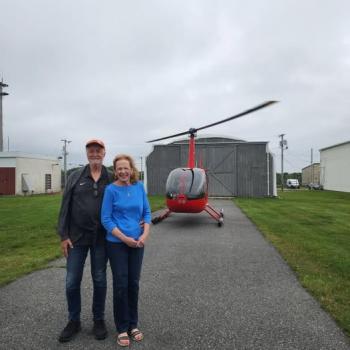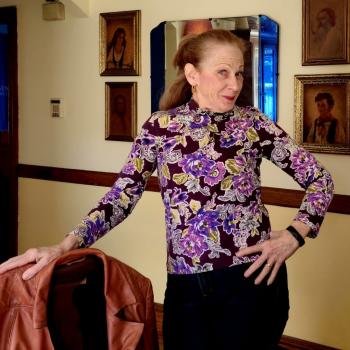One of the most important reasons that Jeanne and I have been able to stay together for almost three decades is that we realized, early on, that although each of us is intensely committed to trying to figure out who God is and what God is up to on a daily basis, our shared commitment works itself out in radically different ways. She and I encounter God in very different places and significantly different manners.  Not long ago, Jeanne went with me to the Episcopal church at which I am a regular for the first time in a while. As is her custom, she worked the room before the service saying hi to people while I sat in back minding my own business. Later one of our friends walked past me and said “Oh, you’re here! You sort of fade into the woodwork when your wife is with you!” This is very true—and exactly as I like it. Last December between Christmas and New Year’s Day we were on Long Island for the joint birthday celebrations of two of Jeanne’s older brothers. Twenty-five people, three generations of a boisterous, extroverted Brooklyn Italian family, lots of extroversion and noise. I’ve been part of this family by marriage for over twenty-five years; I found myself sitting in the family room with a young guy who is in a serious relationship with one of Jeanne’s nieces—he’s new to this spectacle and had a bit of a deer-in-the-headlights look.
Not long ago, Jeanne went with me to the Episcopal church at which I am a regular for the first time in a while. As is her custom, she worked the room before the service saying hi to people while I sat in back minding my own business. Later one of our friends walked past me and said “Oh, you’re here! You sort of fade into the woodwork when your wife is with you!” This is very true—and exactly as I like it. Last December between Christmas and New Year’s Day we were on Long Island for the joint birthday celebrations of two of Jeanne’s older brothers. Twenty-five people, three generations of a boisterous, extroverted Brooklyn Italian family, lots of extroversion and noise. I’ve been part of this family by marriage for over twenty-five years; I found myself sitting in the family room with a young guy who is in a serious relationship with one of Jeanne’s nieces—he’s new to this spectacle and had a bit of a deer-in-the-headlights look. I told him that I have survived these events for a quarter century because I learned early on that as long as you sit in the same place and don’t say anything, you’ll be fine. Not a difficult thing for an introvert.
I told him that I have survived these events for a quarter century because I learned early on that as long as you sit in the same place and don’t say anything, you’ll be fine. Not a difficult thing for an introvert.
As I enjoyed a nice conversation with my cousin and his wife over breakfast last Saturday at their house in southeastern Pennsylvania, Jeanne entered the kitchen. “Wow, you are wired this morning!” she commented to me—“you haven’t stopped talking since you got up!” There’s a reason for that, I replied—even introverts get lonely. My father used to define “extrovert” and “introvert” as follows:
An extrovert is a person who likes being alone, but gets her batteries recharged by being with people.
An introvert is a person who likes people, but gets his batteries recharged by being alone.
As a proud, card-carrying introvert I have known the truth of the second part of the introvert definition for most of my life. I have had the opportunity over the past few weeks to verify the truth of the first part of the definition—even introverts have to be around people sometimes.
I have known for several months that Jeanne would be spending a good deal of June at a workshop/conference/institute in Pennsylvania . As I planned for Jeanne’s three-week absence over the prior two or three months, I was convinced that even though she is my best friend and we have enjoyed spending more time together over the past year, with me on sabbatical and her mostly unemployed, than we have at any previous point in our more than twenty-eight years together, being by myself with the dogs for while wouldn’t be incapacitating. After all, we spent a number of years often only seeing each other every four or five weeks because of Jeanne’s work and travel. I don’t recommend it, but we made it work as well as we could. My normal work day is ten to twelve hours long during which I am surrounded by people, something that I both love and that drains my batteries significantly. As my father’s definition correctly describes, my batteries are recharged by being alone, something that makes my evenings rather quiet whether Jeanne is home or not.
. As I planned for Jeanne’s three-week absence over the prior two or three months, I was convinced that even though she is my best friend and we have enjoyed spending more time together over the past year, with me on sabbatical and her mostly unemployed, than we have at any previous point in our more than twenty-eight years together, being by myself with the dogs for while wouldn’t be incapacitating. After all, we spent a number of years often only seeing each other every four or five weeks because of Jeanne’s work and travel. I don’t recommend it, but we made it work as well as we could. My normal work day is ten to twelve hours long during which I am surrounded by people, something that I both love and that drains my batteries significantly. As my father’s definition correctly describes, my batteries are recharged by being alone, something that makes my evenings rather quiet whether Jeanne is home or not.
The day after dropping Jeanne off in Pennsylvania and enduring a seemingly endless eight-hour drive home in the rain, I began what turned out to be a predictable daily routine. The dogs, awaiting my slightest movement as soon as it starts getting light, had me up at 5:30. Then bike riding—due to an unbroken stretch of the most perfect June weather imaginable, I rode 135 miles the first week and 155 miles the second week as I work my way back into the same riding shape I was in last fall when I broke my ankle. My book is at the publisher at the beginning of the editing process, out of my hands for the next few weeks, so I wrote blog posts, started working on my syllabi for the fall, read, took care of the lawn, watched way too much TV, bought food every once in a while and—for the first six days Jeanne was gone—did not talk to another human being other than on the telephone. In the middle of June, there is literally no one on campus—not in the department, not at the gym, the on-campus Dunkin’ Donuts has no line of waiting customers. The colleagues I have a beer with occasionally were all out of town. No classes or meetings to prepare for or to fill up the day.  And I was bored. Actually, it wasn’t boredom. For the first time in memory, I was lonesome.
And I was bored. Actually, it wasn’t boredom. For the first time in memory, I was lonesome.
I played the organ at church a week after leaving Jeanne in Pennsylvania, the first opportunity I had to interact with other humans in several days. The following Tuesday I was part of a committee meeting at church in the late afternoon, followed by the monthly meeting of my seminar group Living Stones. I realized later that I probably had talked non-stop in both meetings, simply because it was my first extended opportunity to be with people in a while. There is probably some algorithm that establishes the allotted spoken words per week for a person depending on her or his place on the introvert/extrovert scale—much lower for extreme introverts than for other people, of course. As a professor I use up most of my allotment in the classroom, setting the stage for lots of silence when I am not in front of students. But when classes are not in session and there are only dogs at home to talk to, the extreme introvert has to find other venues for word usage—I used all of mine up that Tuesday.
But when classes are not in session and there are only dogs at home to talk to, the extreme introvert has to find other venues for word usage—I used all of mine up that Tuesday.
Jeanne, occupying the extreme opposite end of the introvert/extrovert spectrum from me, has had several jobs over the past few years that allow her to do most of her work from home. This drove her crazy, since she works best in direct and regular face-to-face contact with other human beings—not just because that’s her collaborative working style but also because she’s an extrovert who can’t stand being along for long stretches of time. On days when solitude became too oppressive, she would go to the grocery store even if we didn’t need anything just so she could see other featherless bipeds and strike up conversations whether they liked it or not. Such an activity would be a special circle of introvert’s hell.
The Saturday morning a week ago that Jeanne commented on my uncharacteristic chattiness was the first morning after I retrieved her from her three-week expedition. When I reminded Jeanne that I had been largely by myself for three straight, she backed off her teasing immediately. “You’re right, you’re right,” she said. “Even introverts get lonely.” Indeed they do—but now she’s back and all’s right with the world.












